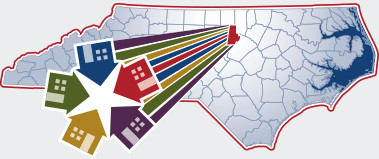#Throwback Thursday, CEO Anthony Scott Makes the Case for Affordable Housing in Durham
CEO Anthony Scott makes the case for Affordable Housing in Durham. Check out this #ThrowbackThursday article.
By Caleb Harshberger, Staff Writer
Triangle Business Journal
Posted April 15, 2021
BizJournals.com/triangle/
Durham Housing Authority CEO Anthony Scott is at the forefront of the push for affordable housing in the Bull City, and his combination of experience and leadership is winning results.
For the last 30 years and across four states, Durham Housing Authority CEO Anthony Scott has led community development and affordable housing organizations, developing and bolstering states and cities in their efforts to improve access to affordable housing and economic opportunities in their communities.
And for the last five years at the head of the DHA, Scott continues to pursue initiatives to provide new housing and opportunities to Durham residents even as explosive growth sends housing costs ever higher.
Through it all, Scott continues to make the case that housing affordability is an integral part of economic development. As more and more resources go to attracting new companies to the region, he said housing affordability is an important factor in businesses choosing where to locate.
Scott grew up in Delaware and earned a degree in architecture at Howard University. While there, he realized a new passion for designing and developing the communities that contextualize those developments.
"I wanted to be an architect since the seventh grade. When I got there, I started to look at it differently," he said. "It started in my undergrad - pulling the pieces together between a building and a community and seeing that a building is one thing, but how you look at it in context of the community is something else."
At UCLA, Scott enrolled in the urban planning program and was soon connecting with various nonprofits, affordable housing organizations and local government departments working to guide growth in the city. He got an internship with the mayor's office and connected with the Dunbar Economic Development Corp., rising to executive director.
In 2000, Scott and his wife decided it was time to head back east.
"Both my wife and I are from the East Coast, and when we had kids we said we need to decide if we were going to be in L.A. or head back east to family," he said.
Scott joined the Virginia Department of Housing and Community Development. After three years, he got a job at the Richmond Redevelopment and Housing Authority and eventually became CEO.
"We had the power of eminent domain," he said. "...We created redevelopment areas in the city."
By 2011, Scott was on to his next role as deputy director of development for the Baltimore Housing Authority, and he came with big hopes for the job. The BHA, he explains, was a Move to Work agency, one of just 39 in the country, meaning it had a great deal more flexibility in how it allocates funding than other non-MTW authorities.
"Housing authorities with that designation have done some really innovative things over the years. And some have changed the way housing authorities (perform) overall," Scott said.
But Scott was "disappointed we couldn't do more. We had to climb our way out of legacy issues."
In 2016, he became DHA's CEO - and he has not been disappointed.
"The things that I was excited for, the opportunities here, were better than I imagined," Scott said.
He said the DHA benefits from a number of complementary advantages, from a city government on board with their efforts to a willing citizenry excited to vote for new initiatives.
"Durham really got it as a city with a big 'C' and as a city with a small 'c,'" he said. "They were able to look forward and say with the growth Durham is having, unless we tackle the affordable housing challenge we're going to be in a situation where Durham isn't affordable, and it won't be able to remain so."
For example, residents in Durham overwhelmingly voted in support of a $95 million affordable housing bond in 2019 to go to housing low income individuals throughout Durham.
And over the last five years, Scott has put a number of projects in motion though initiatives such as the DHA Downtown and Neighborhood Plan.
The plan leverages authority-owned land throughout the city and finds private development partners to redevelop and repair existing affordable housing to provide hundreds of new housing units across the city.
The authority has identified seven of its properties in and around downtown Durham and has begun working with developers on plans for communities on these parcels.
The plan is expected to generate over 2,400 units at varying levels of affordability.
And Scott is quick to point out that the authority's work is not just about providing officially designated affordable housing.
There are still, of course, challenges.
The explosion in growth and developer interest in Durham increasingly pushes market rate home prices and rental rates higher, sometimes beggaring belief by residents who remember a more affordable Durham.
"Look at all the market rate housing, or what I like to call the above market rate housing," he said. "I saw a 3-bedroom (apartment) listed for $6,000. I said, 'Are you kidding me?' Look what apartments are renting for - and I mean I'm shocked."
This is a problem, Scott said, that can impact more than low-income renters. As more and more resources go into attracting new companies to the region, he said it's important to remember that housing affordability is often a major component in a company's decision to locate in a region.
"Affordable housing is economic development," Scott said. "When you think about companies coming here and growing, if affordability is so high it's difficult for their employees to find housing, it's difficult for that company to say, 'Yeah I want to come to the Triangle area.'"


